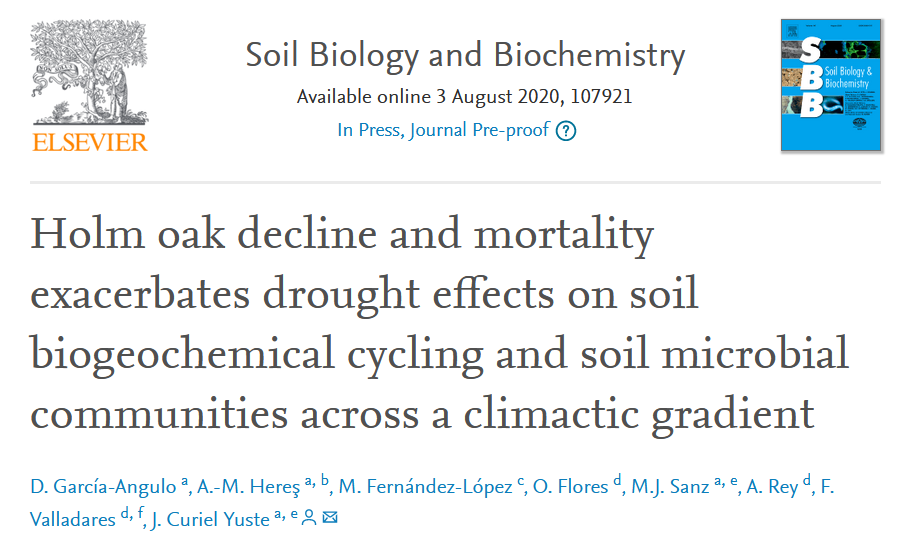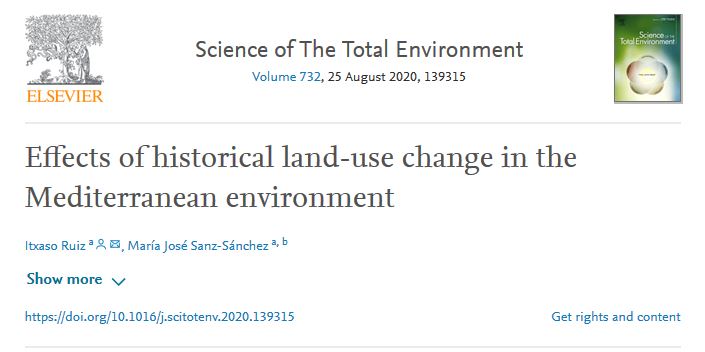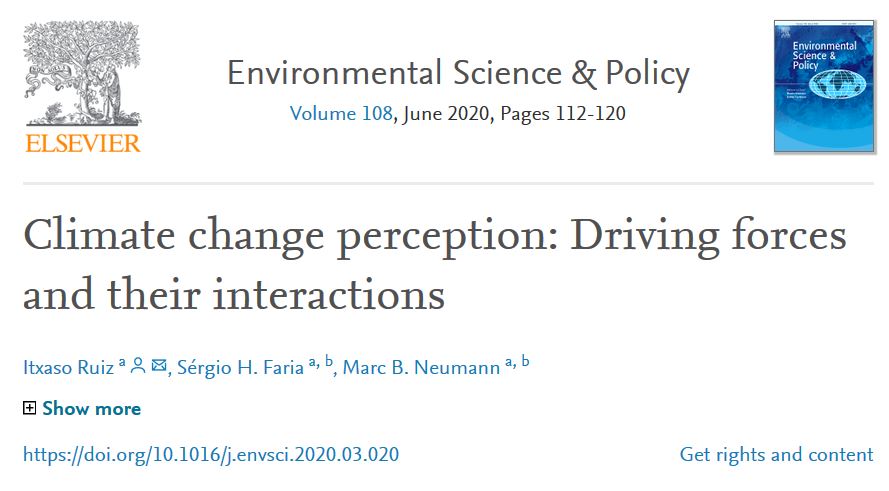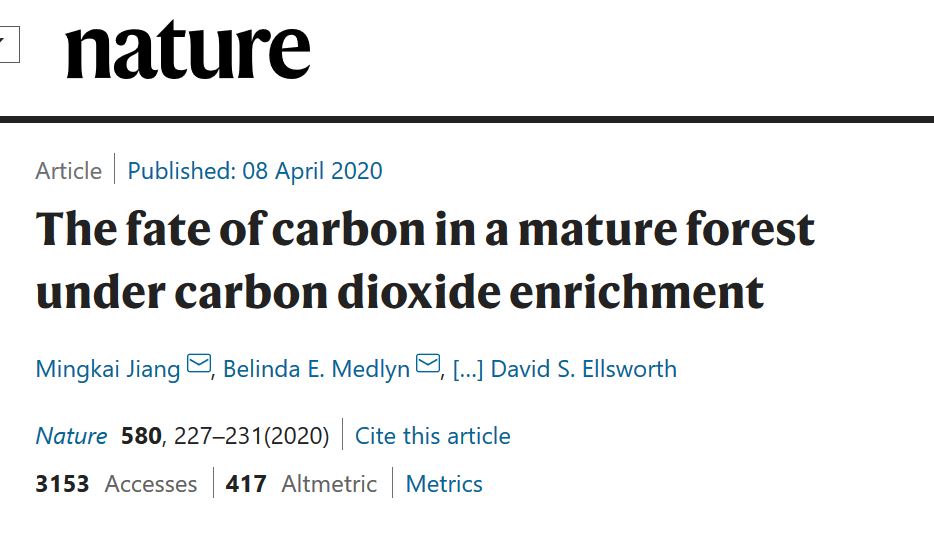Research
15 iraila, 2020
Published by BC3Research at 15 iraila, 2020
Categories
Mundo Ganadero aldizkarian Elena Galan de Castillok, BC3 - Basque Centre for Climate Changeko ikertzaileak, argitaratutako azken artikuluak, hausnarkari txikietan egunean bi jetzi izatetik jetzi bat izatera igarotzearen ondorioak laburbiltzen ditu, 203 azterlanetan oinarrituta. Azterlan horietatik 41 hautatu ziren sintesi kualitatiborako.
6 abuztua, 2020
Published by BC3Research Daniel Garcia Jorge Curiel Maria Jose Sanz at 6 abuztua, 2020
The extent to which the increasingly frequent episodes of drought-induced tree decline and mortality could alter key soil biogeochemical cycles is unclear. Understanding this connection between tree decline and mortality and soils is important because forested ecosystems serve as important long-term sinks for carbon (C) and essential nutrients (e.g., nitrogen and phosphorus).
1 ekaina, 2020
Published by BC3Research Itxaso Ruiz Maria Jose Sanz at 1 ekaina, 2020
During the Holocene (last ~11,700 years), societies have continuously modified the landscape of the Mediterranean Basin through changes in land-use, exerting extraordinary pressures onto the environment and adding variability to the climate. Despite its importance to current land management, knowledge of how past land-use practices have impacted the regional climate of the Basin remains largely in the scientific sphere.
28 apirila, 2020
Published by Maria Jose Sanz Mikel González-Eguino BC3Research at 28 apirila, 2020
Categories
Funcasek ,BC3 - Basque Centre for Climate Change lankidetzarekin, Espainiako karbono trantsizio baxuari buruzko liburu berria argitaratu du. "Transición hacia una economía baja en carbono" liburua María José Sanz BC3ko zuzendari zientifikoak eta MIkel González-Eguino. BC3ko ikertzaile seniorrak argitaratu dute.FUNCAS irabazi-asmorik gabeko erakunde pribatua da, CECAk sortu eta finantzatua, kapital sozialean egiten dituen inbertsioen esparruan, Espainiako gizarteari mesede egiten dioten jarduerak gauzatzeko, aurrezkiaren kultura sustatzeko eta aurrezki-kutxek komunitateari eskaintzen dizkioten zerbitzuei buruz sentsibilizatzen laguntzeko. Espainiako karbono gutxiko ekonomiarako trantsizioa
24 apirila, 2020
Published by BC3Research Itxaso Ruiz at 24 apirila, 2020
Public perception of climate change can either facilitate or hinder the implementation of climate policies. This perception is dependent on a number of influencing factors, called drivers, in ways that are still not clearly understood. Our study quantifies the relative strength of drivers of climate change perception, taking into account differences in the social, political, geographical, economic and educational identities of any considered community.
16 apirila, 2020
Published by BC3Research David Moreno Asun Rodríguez at 16 apirila, 2020
Multiple large-scale restoration strategies are emerging globally to counteract ecosystem degradation and biodiversity loss. However, restoration often remains insufficient to offset that loss. To address this challenge, we propose to focus restoration science on the long-term (centuries to millennia) re-assembly of degraded ecosystem complexity integrating interaction network and evolutionary potential approaches. This approach provides insights into eco-evolutionary feedbacks determining the structure, functioning and stability of recovering ecosystems. Eco-evolutionary feedbacks may help to understand changes in the adaptive potential after disturbance of metacommunity hub species with core structural and functional roles for their use in restoration.
14 apirila, 2020
Published by Teresa Gimeno BC3Research at 14 apirila, 2020
Categories
Atmospheric carbon dioxide enrichment (eCO2) can enhance plant carbon uptake and growth, thereby providing an important negative feedback to climate change by slowing the rate of increase of the atmospheric CO2 concentration. Although evidence gathered from young aggrading forests has generally indicated a strong CO2 fertilization effect on biomass growth, it is unclear whether mature forests respond to eCO2 in a similar way.
26 martxoa, 2020
Published by BC3Research Asun Rodríguez at 26 martxoa, 2020
Restoration ecology is a young scientific discipline whose limitations can compromise the recovery of ecosystem biodiversity and functions. Specifically for limitations on forest restoration, we first recommend considering measures prior to land use changes to deal with the common lack of efforts to anticipate and plan restoration. Second, we suggest using multiple references in restoration planning to avoid simplified reference characterization, and we advise assessing ecosystem recovery with indicators that better incorporate ecosystem complexity in recovery assessments.
25 martxoa, 2020
Published by BC3Research Iratxe Rubio at 25 martxoa, 2020
There is broad evidence of climate change causing shifts in fish distribution worldwide, but less is known about the response of fisheries to these changes. Responses to climate‐driven shifts in a fishery may be constrained by existing management or institutional arrangements and technological settings. In order to understand how fisheries are responding to ocean warming, we investigate purse seine fleets targeting tropical tunas in the east Atlantic Ocean using effort and sea surface temperature anomaly (SSTA) data from 1991 to 2017.
20 martxoa, 2020
Published by BC3Research Asun Rodríguez at 20 martxoa, 2020
A pesar del rápido crecimiento del uso de la restauración, esta no siempre genera una respuesta a corto plazo en los ecosistemas que garantice la recuperación de su estructura, funciones y servicios. Hasta ahora, la mayoría de los estudios que han evaluado la recuperación de ecosistemas utilizaban métricas que ignoran la complejidad necesaria para estructurar las comunidades de organismos que conforman los ecosistemas.










